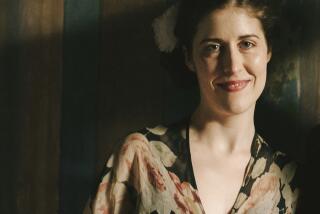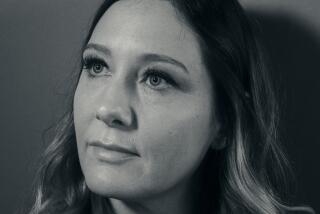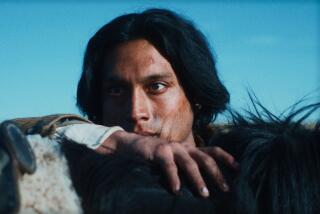‘Australia’ Goes Beyond the Outback and Koalas
- Share via
Time magazine art critic Robert Hughes nearly died in a head-on collision last May. He was on a fishing trip in his native Australia and had started filming a documentary on how the nation had evolved in the more than 30 years since he’d moved away. The accident changed everything.
Hughes’ film was supposed to be a historical treatise on how Australia has evolved since the 18th century, when it was a British penal colony. But it became much more personal.
“You don’t get the full gamut of your feelings about a place until you realize you’re about to die in it,” he said.
The result is the six-hour PBS series “Australia: Beyond the Fatal Shore,” which will be broadcast Tuesday through Thursday, just in time to offer a detailed backdrop for the Sydney Olympics.
“I wanted it to be arty,” said Hughes, who now lives in New York. With vibrant colors, creative editing, a quick pace and a modern jazz soundtrack, it’s so unlike a Ken Burns film that you may doubt you’re watching PBS.
Being raised in Australia, Hughes said, “helped me become the kind of art critic that I am. I have a considerable curiosity. And it gave me a certain skepticism about some of the claims about America.”
For example, not long ago, “America felt that it was the art center of the world. That always struck me as a little dubious. I’m interested in the exceptions . . . of being on the edge.”
For a nation that was little known until Britain began dumping convicts there, Australia has come a long way. Compared with the United States, the country is remarkably small, with a population of about 20 million, of which fewer than 2% are Aborigines.
The touchiest topic that the country continues to grapple with is the status of Aborigines and the history of white Australians’ brutal treatment of them. Although some gains have been made by returning land to the people who have lived in the harsh outback for 40,000 years, the government refuses to apologize for any wrongdoing.
There are other hot buttons in this rapidly changing nation, including how waves of immigrants are altering the face of white Australia. Hughes tackles all of these issues and much more in his six-hour script, which reveals a complex and contradictory place, one about which Americans are largely clueless.
“Practically all Americans get on TV is a whole lot about cute marsupials and dangerous crocodiles,” Hughes said. But Australia is not “a picturesque and slightly dangerous petting zoo.”
Still, he said, “I couldn’t cover everything. By its very nature, the life of a 20-million-person society is not something you can capsulate in six hours.”
So he started with the presumption that the viewers who tune in are interested in more than the Sydney Olympics, which are not addressed in the film: “How do you film something that has not happened?” he asked.
“Obviously the series is not made for fools. So I assume the viewer is educated and has some knowledge of the world and above all wants to find out more about it.”
So Hughes fit in a lot of history.
“I wanted to prove that it’s not like America. It’s a very distinct place. It’s not the lost American Wild West. It has its own kind of spirituality and sense of humor and attitude.
“Also I wanted to evoke something of the Australia of the past that formed the Australia of the present. In order to do that, the producer said, ‘Put something of yourself in it.’ ”
So although Hughes’ family was not part of the early wave of convicts and jailers but immigrated later, in 1837, the documentary comes off as a personal essay, which he said he embraced after “a certain initial reluctance.”
“To a degree, the story of my family is the same as the story of Australia in terms of class,” he said. Hughes revisits his upscale childhood home and boys school to show how much things have changed--and how much they have stayed the same.
One change that is slow in coming is that of forming its own republic. To the frustration of many, Australia is still a commonwealth of England and cannot elect its own head of state. But that could change soon, Hughes believes.
The variety of national origins represented in the country, he said, will lead to a final break from England. “These folks will not have reverence for the queen of England, just as a guy from England wouldn’t bow down in reverence to Bill Clinton,” he said.
Overall, Hughes said, “I think it’s a great place. The fact that I don’t live there is not a reflection on that. . . . I’m still an Australian citizen.”
He is especially proud of the melting pot that his nation has become: “We do it well, better than America.”
* “Australia: Beyond the Fatal Shore” will be shown Tuesday, Wednesday and Thursday at 9 p.m. on KCET-TV and KVCR-TV.
More to Read
The complete guide to home viewing
Get Screen Gab for everything about the TV shows and streaming movies everyone’s talking about.
You may occasionally receive promotional content from the Los Angeles Times.






